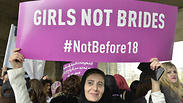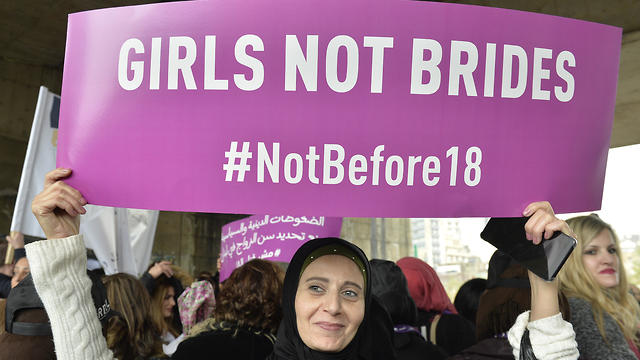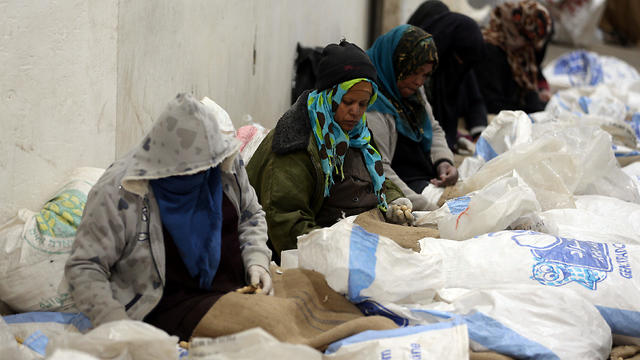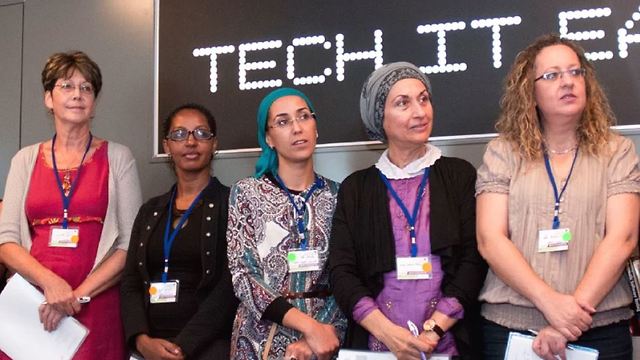
Photo: EPA
Celebrating International Women’s Day, Middle East style
From Jordan to Israel, Lebanon to the West Bank, women across the region are marking the annual event with conferences, campaigns and demonstrations for gender equality.
International Women’s Day, occurring annually on March 8, is a global celebration of women and a movement toward gender equality. This year’s theme is #BalanceForBetter, emphasizing the need for a more gender-balanced world. Many organizations in the Middle East will be marking the day in their respective countries.

The Arab Women’s Organization of Jordan (AWO) held a conference on March 6 to shed light on issues relating to gender equality and the empowerment of women and girls.
Manal Al-Taleb, Program Coordinator for the Women’s Political Participation Program at the AWO, says the event focused on issues relating to labor law in the context of women’s rights, as well as social protection for women, girls and Syrian refugees in Jordan. It was held under the patronage of the minister of social development, and many members of parliament were scheduled to attend, as was the UN Women Jordan representative.
“We will also be celebrating the 40th anniversary of the Convention on the Elimination of all Forms of Discrimination Against Women (CEDAW), as well as preparing for the celebration of our 50th anniversary occurring in 2020,” Taleb said.
The Palestinian Business Women’s Association (PBWA) launched a campaign titled “My Rights, Our Power!”—a one-week event ending on International Women’s Day. Over 30 national and international partners from civic and social organizations, as well as international development agencies in Jerusalem, the West Bank and Gaza Strip, are participating to promote women’s rights in the Palestinian territories.
“Palestinian women face a lot of obstacles, and this campaign aims to raise awareness of women’s rights so they will be in line with the international standard for family protection, such as equal opportunities between men and women, a life free of violence, and the right to make your own choices,” says Merne Zideh, program manager at PBWA.
In a similar vein, the Palestinian Working Woman Society for Development (PWWSD) has been focusing for three years now on women’s rights.
“The differing laws in the territories are based on outdated (personal status) laws stemming from Jordan, Egypt and other sources dating back to the Ottoman Empire and British Mandate,” says Sandy Hanna, Advocacy Manager for PWWSD.
“We are demanding a unified, civil-based law that provides more attention to the needs of women, as well as demanding an increase in the minimum age for marriage from 16 to 18,” she added.
Last year on International Women’s Day, the Palestinian cabinet endorsed three rights for women originally allowed only for husbands or male family members: namely, transferring children from one school to another; applying for passports; and opening bank accounts.
In Beirut, the Lebanese Democratic Women’s Gathering (RDFL) held a demonstration on March 2 that gathered 3,000 people in order to pressure the government to enact a proposed law to end child marriage by making the legal minimum age 18, an issue that the organization has been working on for years.
In addition, Lara Shehab, Head of Programs at RDFL, told The Media Line that the organization had been lobbying and advocating in regard to a law that prohibits Lebanese women from transmitting their nationality to their children.

A Lebanese woman carries a placard as she takes part in a protest against child marriage in Beirut (Photo: EPA)
The Arab Institute for Women at the Lebanese American University, which participated in last week’s Beirut demonstration, has worked to address women’s political and economic participation, such as imposing a quota system in politics, removing discriminatory laws in the workplace and reforming the security sector.
“I’m optimistic because civil society organizations are very active, and important issues are no longer hush-hush,” says Myriam Sfeir, director of the institute.
The Lebanese League for Women in Business (LLWB) launched a campaign to increase the number of women on boards of directors, the target being 30 percent by 2025. It has also introduced an audit to determine the extent to which gender equality is taken into consideration in business, says Zeina Mhaidly, LLWB’s program manager.
In Israel, the NGO Economic Empowerment for Women aids low-income women in creating small businesses due to challenges they face in the job market.
“Women make 40% less than men, and there are many stories of women being discriminated against and not getting jobs,” says Claudia Goodich-Avram, the group’s Resource Development Director. “There are restrictions depending on your family status (and level of) religiosity, and if you’re from an Arab town, there are problems with transportation.”
The organization is part of Shutafot (Partners), a coalition of women’s groups holding events in honor of International Women’s Day. One of these groups, Achoti (My Sister), is mounting an exhibition at the EU Embassy on female artists that experience racism in Israel. Other events being held by members of the coalition include one in the northern port city of Haifa that features lectures and workshops organized by Isha L’Isha–Haifa Feminist Center.












